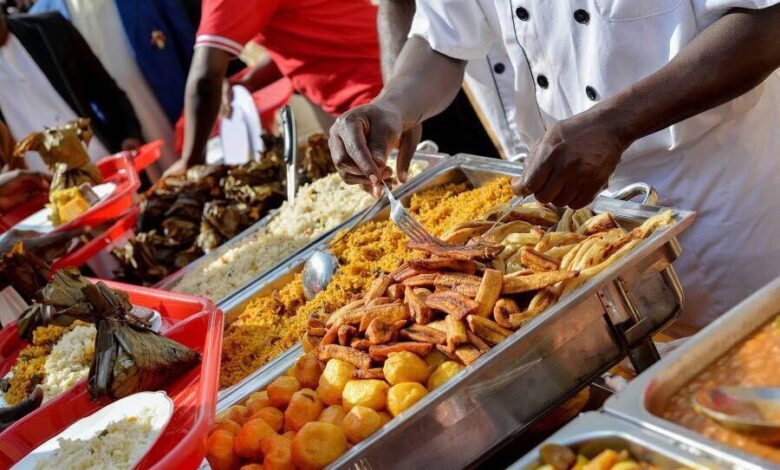Should service providers be fed at weddings and introductions?
Many professionals in the wedding industry emphasize the importance of taking care of service providers, especially when it comes to food. MCs, DJs, photographers, videographers, and even decorators often spend hours on their feet, ensuring the event runs smoothly. By the time lunch or dinner is served, they are usually exhausted and hungry.

Weddings and introductions are significant milestones in life, and planning them can be both joyous and stressful. The decision of whether to provide food to service providers at weddings and introductions has long been a topic of debate among couples and service providers alike.
Take the experience of renowned comedian Patrick Idringi, aka Salvador, who recalls a shocking incident at a wedding where he was unceremoniously denied food.
“I will never forget the chairperson of the wedding bouncing me from the line for food. I thought it was a joke until she physically grabbed the plate from my hand, shouting, ‘Tetwakusasude?’ (Didn’t we already pay you?).”
Salvador, clearly embarrassed, handed the microphone over to the DJs and left to find food elsewhere, only returning after the groom called him. “There was an issue between the couple and the chairperson, but the damage was already done. It was my worst wedding ever,” he recalled.
This experience raises an important question for couples planning weddings and introductions: Should service providers be catered for when it comes to food?
The argument for feeding service providers
Many professionals in the wedding industry emphasize the importance of taking care of service providers, especially when it comes to food. MCs, DJs, photographers, videographers, and even decorators often spend hours on their feet, ensuring the event runs smoothly. By the time lunch or dinner is served, they are usually exhausted and hungry.
Henry Tyaba, an event planner from Classic Events, supports Salvador’s perspective, noting that the work service providers do is often exhausting and time-consuming.
“Many of us start working from early morning, setting up, coordinating, and managing everything. It’s only fair that we get food, especially when the event lasts the whole day,” Tyaba said.
He points out that, after hours of work, it’s not practical for providers to leave the venue to grab a meal, as they may miss critical moments or details.
On the other hand, Mutebi Patrick, a photographer from Zion Media, offers a balanced view. “I understand the costs involved in feeding everyone, but I also believe in clear communication. If we know from the beginning that food won’t be provided, we can make our own arrangements,” he said. “But when you expect us to work the whole day without a break and then deny us a meal, that’s when it becomes a problem.”
Not everyone agrees that service providers should be given meals. Sophie Nantongo of Sophie Juices is one such voice, arguing that since service providers are paid for their work, they should make their own meal arrangements.
“Why should we pay someone for a service and then also feed them?” she asked. “Service providers are not guests. They are there to work, and their meals should be their responsibility, especially in cases where food is charged per plate.”
Nantongo noted that in cases where weddings are held in hotels or upscale venues where catering is priced per plate, often running into tens of thousands of shillings per head.
“If a wedding has ten or more service providers, and you’re paying for each of their meals at Shs 50,000 per plate, that’s an extra Shs 500,000 added to the budget for just three people. For some couples, that’s too much to add on top of everything else.”
Additionally, some couples might argue that they already have enough to budget for, including the venue, décor, cake, and the guest list itself. They may feel it’s the responsibility of the service providers to cater for themselves, just as they would at any other job. After all, if service providers know they will be working long hours, they should plan for their own food and snacks.
Striking a balance
As with many aspects of wedding planning, the decision on whether or not to feed service providers comes down to the couple’s budget and preferences. Some couples are willing to provide meals, understanding the hard work that goes into making their special day run smoothly, while others might not be able to stretch their finances that far.
One compromise could be communicating openly with service providers beforehand. For example, some couples provide a packed lunch for their service providers instead of including them in the catered meal for guests. Others make arrangements for a separate meal plan, offering simpler food.
Additionally, couples should set clear expectations from the start. “It’s crucial for couples to discuss this issue with their service providers in advance,” said an event planner. “If you don’t plan to offer food, let them know so they can make their own arrangements. The last thing you want is a frustrated MC or photographer who’s too hungry to do their job well.”
It’s not just about saving costs but also about respect and appreciation for those working tirelessly behind the scenes to make these events memorable.







